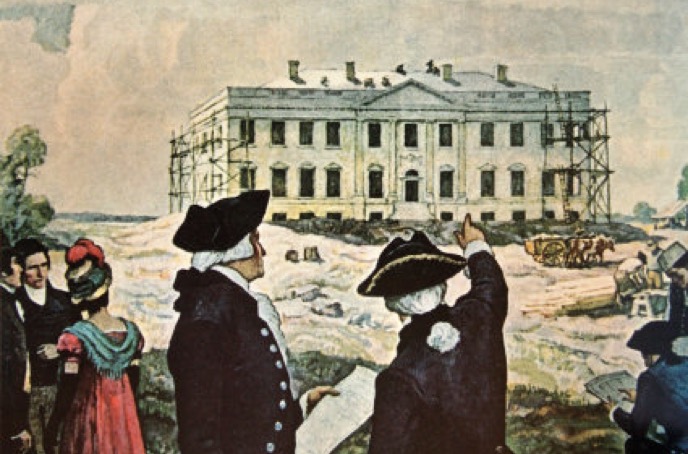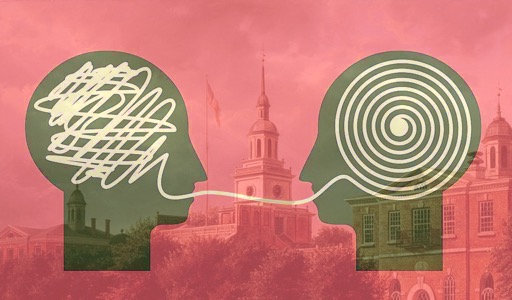Only justice preserves regimes, not history or tradition.
Conservative Rationalism is Not Enlightenment Rationalism

Political prudence requires reason—which is why a "conservative rationalism" that embraces universals and particulars alike is needed now more than ever.
Hazony’s essay, adapted and published at The American Mind, was first delivered as lecture at Harvard Law School entitled “A Confederacy of Prodigies: On the Ascendancy of Reason and the Extinction of Conservatism in America.”
Although I don’t understand what Mr. Hazony means in his original title, “A Confederacy of Prodigies,” I get his subtitle, the point of which is that it is reason that has killed or is killing American conservatism. Concerning his argument, which became the essay adapted for The American Mind, a few observations.
Hazony’s is not a new argument. He is well aware that the attack on “Enlightenment rationalism” has a long pedigree, including Edmund Burke, but the attack was more furiously and unrestrainedly pressed on the Continent by such thinkers as Joseph de Maistre. Burke’s criticism was modulated by his simultaneous embrace of natural law or the “genuine rights of man.” Hazony has his own version of that modulation, to which I’ll come in a moment.
Though he is aware of the European tradition of defending tradition against “Enlightenment rationalist political theories” with their reliance on “reason alone,” he doesn’t mention or even allude to the long tradition of American conservatives doing the same—Russell Kirk, Richard Weaver, and Mel Bradford, for example, each with a different spin on the argument, and each illustrating some of the unique difficulties the argument faces in the American context. Each was an opponent of the New Deal, incidentally. Hence Hazony’s choice of a hero of traditionalist American conservatism is an odd one: Franklin D. Roosevelt.
FDR’s foreign policy was better than his domestic policy, but it is still unlikely that he “knew,” as Hazony writes, that America “would have to fight not only Nazism…but possibly Soviet Communism as well.” To put it mildly, FDR thought the Nazis and the Communists were two very different problems.
The speech Hazony comments on, the 1939 State of the Union, was one of FDR’s more religious ones, but even here, FDR’s rhetoric insisted that the “God-fearing democracies” would have to have up-to-date social programs to be worthy of divine favor. Without the New Deal or its equivalent, as he made plain five years later in his 1944 Annual Message, American democracy would be hardly distinguishable from fascism. As Roosevelt put it, “[I]f history were to repeat itself and we were to return to the so-called ‘normalcy’ of the 1920s—then it is certain that even though we shall have conquered our enemies on the battlefields abroad, we shall have yielded to the spirit of Fascism here at home.”
Yet the target of Hazony’s critique is not really Enlightenment rationalism, it is “conservative rationalism,” the futile, foolish, and self-defeating efforts by Catholic natural law thinkers and Straussian scholars, among others, to appeal to “universal reason” themselves and for conservative purposes. In general, he writes, “conservative rationalism has failed,” both by not making things better and indeed by making them worse. By “endorsing the methods and assumptions of Enlightenment rationalism, conservative rationalism has contributed something to the calamity,” leaving once-healthy traditions “largely without defenders.” These conservative theorists didn’t see that any appeal to “universal reason” would play into the Enlightenment’s hands. But why? Is there no other kind of reason besides universal or Enlightenment reason? Hazony does not quite say.
His long quotation from John Selden, the 17thcentury English jurist and expert on the Hebrew scriptures and polity, does not prove what he means it to prove. Selden is not criticizing “Enlightenment rationalist claims,” he is objecting to the ancient philosophers’ varying opinions on the nature of good and evil, just and unjust. This variety was well known to the ancients, and formed the subject of several of Cicero’s dialogues. Variety is not chaos, however, and Selden exaggerates the extent of these philosophical disagreements. Even the teachers and schools of thought that denied any form of natural justice or right (Carneades being a prime example) did not deny the naturalness, and reasonableness, of other virtues like courage, moderation, and, above all, wisdom. But again, it is the faculty of reason itself, taken alone, not “Enlightenment rationalism,” that the Englishman criticizes.
By reason “free and untrammeled” Selden meant without the saving guidance of divine and human law—not merely without the guidance of a prevailing tradition. (And, of course, it takes reason to understand and interpret those laws, which is how a tradition of repeated readings of them develops.) Selden’s point of criticism is the confusing variety of possible interpretations of the laws of nature. Hazony’s point is the quite different one that Enlightenment rationalism drives always in the same direction, toward greater “freedom” and less “constraint.” The problem for Hazony is not an embarrassing variety of disagreements that leaves reason to some extent permanently skeptical of itself; but Enlightenment reason’s arrogant, unyielding confidence in its “perpetual revolution” that “has no stopping point” short of despotism.
Hence Hazony eventually comes to a defense of a kind of reason that is compatible with tradition, a kind of reason different from the Enlightenment’s. Admitting that there are good traditions and bad traditions—and good and bad parts within the same tradition—he admits also the conclusion that there must be some standard by which to distinguish good from bad traditions that is not simply reducible to tradition or inheritance per se. Otherwise, you have the problem of relativism: each tradition judging itself by its own standards of right and wrong.
He takes his stand then for “general principles,” which recognize “the existence of an objective nature and the possibility of discovering objective and generally applicable principles for the flourishing society.” General, not universal, principles; he compares such generalizations to the empirical understanding one develops over time of the difference between a living and a dead, a healthy and a diseased organism. This approach is, he says, rightly, “somewhat Aristotelian.” So after all of Selden’s scorn for the ancients’ philosophical absurdities and disagreements, and all of Hazony’s disparaging assimilation of reason to Enlightenment reason, we are back at Aristotle.
This argument marks Hazony’s philosophical superiority to many other more stubborn, more consistent, but less clear-sighted versions of the case for traditionalism, and he deserves great praise for it. Still, if his argument were even more Aristotelian, it would be still clearer and more persuasive. What Hazony is fumbling for is Aristotle’s distinction between theoretical and practical sciences.
In their place, universal, necessary, and unchanging truths are the peak of knowledge about matters physical and metaphysical, matters which cannot be other than they are. That’s theoretical science, properly so called. The practical sciences concern man, happiness, and human actions on the way to happiness—the moral and political choices, taken in an infinite variety of circumstances, which make us and our societies free and virtuous, or unfree and vicious; more morally healthy or less. The kind of reason that ought to guide human beings confronted by such choices is what Aristotle called practical reason or prudence.
This is the kind of reasoning Hazony strives to defend, but he is loath to call it reasoning precisely because he is under the Enlightenment’s spell. To reason (he thinks) is to universalize, to universalize is to ideologize, and so he rejects reason in politics as in every case, sooner or later, an invitation to the French Revolution, which he politely, and prudently, declines. Ideology, we might say, involves deducing from a universal premise a universal conclusion. Prudence, by contrast, means reasoning from a universal premise to a particular conclusion. That requires judgment, as well as (but not merely) a grasp of a universal or general principle. Slavery is wrong, Lincoln knew, but what can be done about it here and now, without doing more harm than good?
Hazony proceeds as if the main question were between universals (based on Enlightenment rationalism) and particulars (based on inheritance or tradition), but all along the real question is how to relate universals to particulars. You need a knowledge of both, as in a way he admits by resorting to “general principles,” which he says may be expressed very generally, as in the Ten Commandments. In his book on nationalism, he calls those Mosaic precepts “the moral minimum,” which have to be mixed with any nation’s law if its nationalism is to be respectable. It is precisely the Ten Commandments, or more exactly the “second table” of them, that Thomas Aquinas identified with the natural law.
So what finally is the issue between Hazony and the Catholic and Straussian defenders of natural justice he attacked at the beginning? These defenders have always admitted, emphasized even, that every commandment needs to be applied to particular circumstances. “Thou shalt not murder,” true; but is this actual killing a murder, an accident, or a justifiable homicide? In the mutable world of human affairs, moral universals can begin to look like generalizations; but the reason why murder is wrong is no generalization. Its wrongness depends on no human being having by nature such unbounded authority over another human being, his equal. That’s why God, in vouchsafing the Ten Commandments, did not have to specify that he was forbidding human beings from murdering other human beings, not from killing vegetables and bunnies. The commandment’s intelligibility depended on a certain pre-existing or natural moral insight.
The prudential nature of morality, embracing universals and particulars, suggests that “conservative rationalism” is needed now more than ever. Far from leading to the “extinction” of conservatism, as Hazony claims, rationalism may be the key to its revival and flourishing, an event in which both traditionalists and rationalists could rejoice.
The American Mind presents a range of perspectives. Views are writers’ own and do not necessarily represent those of The Claremont Institute.
The American Mind is a publication of the Claremont Institute, a non-profit 501(c)(3) organization, dedicated to restoring the principles of the American Founding to their rightful, preeminent authority in our national life. Interested in supporting our work? Gifts to the Claremont Institute are tax-deductible.
The liberal order rests on conservative, not rationalist, foundations.
The traditions of American civilization carry intelligible moral ideas.
If local communities are to survive, institutionalized shame toward America must be rooted out.
When a good is not enough, we need to nourish it anyway.
Our new world sheds new light on the relations between reason and tradition.






